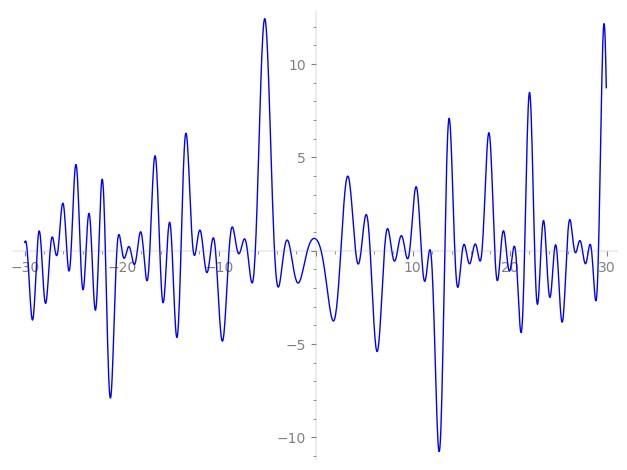| L(s) = 1 | + (−1.22 − 0.707i)2-s + (0.486 − 1.66i)3-s + (0.999 + 1.73i)4-s + (−3.85 + 2.22i)5-s + (−1.77 + 1.69i)6-s + (0.257 − 0.446i)7-s − 2.82i·8-s + (−2.52 − 1.61i)9-s + 6.29·10-s + (3.36 − 0.820i)12-s + (−1.80 − 3.12i)13-s + (−0.630 + 0.364i)14-s + (1.82 + 7.49i)15-s + (−2.00 + 3.46i)16-s + 4.35i·17-s + (1.95 + 3.76i)18-s + ⋯ |
| L(s) = 1 | + (−0.866 − 0.499i)2-s + (0.280 − 0.959i)3-s + (0.499 + 0.866i)4-s + (−1.72 + 0.996i)5-s + (−0.722 + 0.690i)6-s + (0.0973 − 0.168i)7-s − 0.999i·8-s + (−0.842 − 0.538i)9-s + 1.99·10-s + (0.971 − 0.236i)12-s + (−0.499 − 0.866i)13-s + (−0.168 + 0.0973i)14-s + (0.471 + 1.93i)15-s + (−0.500 + 0.866i)16-s + 1.05i·17-s + (0.460 + 0.887i)18-s + ⋯ |
\[\begin{aligned}\Lambda(s)=\mathstrut & 936 ^{s/2} \, \Gamma_{\C}(s) \, L(s)\cr =\mathstrut & (0.975 + 0.218i)\, \overline{\Lambda}(2-s) \end{aligned}\]
\[\begin{aligned}\Lambda(s)=\mathstrut & 936 ^{s/2} \, \Gamma_{\C}(s+1/2) \, L(s)\cr =\mathstrut & (0.975 + 0.218i)\, \overline{\Lambda}(1-s) \end{aligned}\]
Particular Values
| \(L(1)\) |
\(\approx\) |
\(0.631921 - 0.0697804i\) |
| \(L(\frac12)\) |
\(\approx\) |
\(0.631921 - 0.0697804i\) |
| \(L(\frac{3}{2})\) |
|
not available |
| \(L(1)\) |
|
not available |
\(L(s) = \displaystyle \prod_{p} F_p(p^{-s})^{-1} \)
| $p$ | $F_p(T)$ |
|---|
| bad | 2 | \( 1 + (1.22 + 0.707i)T \) |
| 3 | \( 1 + (-0.486 + 1.66i)T \) |
| 13 | \( 1 + (1.80 + 3.12i)T \) |
| good | 5 | \( 1 + (3.85 - 2.22i)T + (2.5 - 4.33i)T^{2} \) |
| 7 | \( 1 + (-0.257 + 0.446i)T + (-3.5 - 6.06i)T^{2} \) |
| 11 | \( 1 + (-5.5 - 9.52i)T^{2} \) |
| 17 | \( 1 - 4.35iT - 17T^{2} \) |
| 19 | \( 1 - 19T^{2} \) |
| 23 | \( 1 + (-11.5 + 19.9i)T^{2} \) |
| 29 | \( 1 + (-14.5 - 25.1i)T^{2} \) |
| 31 | \( 1 + (-5.47 - 9.48i)T + (-15.5 + 26.8i)T^{2} \) |
| 37 | \( 1 - 9.80T + 37T^{2} \) |
| 41 | \( 1 + (-20.5 + 35.5i)T^{2} \) |
| 43 | \( 1 + (-1.41 + 2.44i)T + (-21.5 - 37.2i)T^{2} \) |
| 47 | \( 1 + (-10.1 - 5.85i)T + (23.5 + 40.7i)T^{2} \) |
| 53 | \( 1 + 53T^{2} \) |
| 59 | \( 1 + (-29.5 + 51.0i)T^{2} \) |
| 61 | \( 1 + (30.5 + 52.8i)T^{2} \) |
| 67 | \( 1 + (33.5 - 58.0i)T^{2} \) |
| 71 | \( 1 + 8.27iT - 71T^{2} \) |
| 73 | \( 1 - 73T^{2} \) |
| 79 | \( 1 + (39.5 + 68.4i)T^{2} \) |
| 83 | \( 1 + (-41.5 - 71.8i)T^{2} \) |
| 89 | \( 1 + 89T^{2} \) |
| 97 | \( 1 + (48.5 + 84.0i)T^{2} \) |
| show more | |
| show less | |
\(L(s) = \displaystyle\prod_p \ \prod_{j=1}^{2} (1 - \alpha_{j,p}\, p^{-s})^{-1}\)
Imaginary part of the first few zeros on the critical line
−10.32798888747937275928459923047, −8.936666883766593383299094412717, −8.078092925998988549933232663994, −7.74613751645411937440884356160, −7.03949681689927821973993964532, −6.22712179214990064264982103604, −4.24835210798857072631635422868, −3.26426280845272104025974565385, −2.59416208395479618831446094486, −0.865028516905345819325377929889,
0.55435861138399705999303412668, 2.58976974780529855098227710646, 4.10837188079460222897697104516, 4.67663451995353990321245145925, 5.61170789122894094610907191692, 7.08107103833247748205898095451, 7.83573977398577099670352708985, 8.430811278891412240579651797799, 9.223747927899119900184281453197, 9.679405471536809751504091962884

